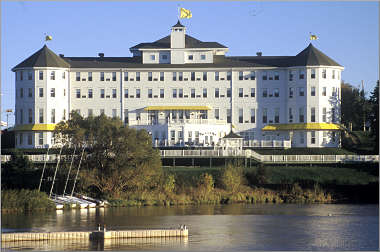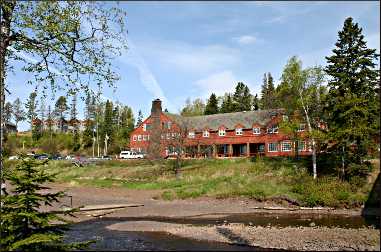Word of mouse
By posting reviews on travel forums, the public wields a lot of power.

© Beth Gauper
If you're planning a vacation, remember this: The people have spoken.
They've spoken about the meals they ate, hotels they slept in, tours they took, attractions they visited and people they met. They've gone on and on about beaches and bars and bathrooms and what they had for breakfast.
It's the kind of thing that bores their friends to death — and yet strangers around the world are eating it up.
Every day, millions log onto TripAdvisor and other online guides, reading what other people have to say about vacation destinations.
Now any Joe Schmo can find someone who actually wants to hear about the great time he had and see those great pictures he took — and he's happy to oblige.
Poison pen
Sometimes, they come as a shock. Zig Gudrais of the Candlelight Inn in Red Wing, Minn., hadn't even heard of TripAdvisor until a disgruntled guest wrote a bad review in September 2005 and e-mailed him a link.
She'd stayed over her anniversary and accepted the inn's free anniversary package of a dozen roses, a bottle of champagne and two specially engraved glasses, Gudrais says.
She and her husband slept in their room, ate breakfast the next day, took their roses and glasses home and then asked for their money back, specifically citing the breakfast prepared by his wife, Lynette, a food columnist for the Red Wing Republican Eagle.
Gudrais offered a certificate for another night's stay, but that wasn't good enough.
"She said, 'Give me a full refund or I'll write a bad review on TripAdvisor,' and I didn't care, because I didn't even know what it was," Gudrais says.
Chris Brown Mahoney of Red Wing's Moondance Inn got several excellent reviews from guests. But then she, too, was threatened by a guest who said she was unsatisfied.
"She said, 'If I don't get a full refund, I'm going to be writing on TripAdvisor and everywhere else,' and she did," Mahoney said. "Honestly, it was the worst experience we've ever had."
Nevertheless, Mahoney uses TripAdvisor herself when planning a vacation.

© Beth Gauper
"I never put too much stock in it," she says. "When I look at a property, if there's only one or two reviews, I don't pay too much attention, unless both are horrible. I guess I'm looking for numbers; if nine out of 10 people like it, that's great."
Reading between the lines
I use TripAdvisor, too, especially when I'm going to an unfamiliar destination. Like Olympic ice-skating judges, I throw out the highest score and the lowest score and average out the rest.
So far, it's worked pretty well. Before I bought a cheap air-hotel package to Mazatlan, I quickly checked reviews of the hotel, the Playa Mazatlan.
As usual, Americans were complaining about hard beds and air conditioning; I ignored that, giving more weight to location, cleanliness and hospitality. Some of the guests mentioned noise from nearby bars; I brought ear plugs. I went with a girlfriend, and we adored the Playa.
Reviews also can tell you where not to stay. Where do the party animals go? The pampered princesses? The snobs?
Those are the places I cross off my list. I don't want to rub shoulders with the likes of the American man who sneered about the Mexican staff at his hotel: "They need to remember that they're the overhead and we're the profit."
Only a few of the comments are truly appalling. Some people are whiners and cranks, but most try to be helpful to others.
When I planned a trip to Puerto Vallarta, I was almost ready to reserve at a small hotel next to a quiet park, until TripAdvisor members informed me the park was being torn up for a parking lot.
That's information you won't find in printed guidebooks, which are more than a year out of date by the time they hit bookstores.
Eventually, I settled on a hillside B&B that guests loved despite the steep climb required to get to it. Reviews that clearly explain such potential drawbacks actually help an inn by keeping out guests who would be upset by it and then tell all their friends - or the whole world, these days.
Forewarned is forearmed. When I stayed at the newly opened Casa Mexicana in Cozumel, I liked it very much but was sure that many tourists would kvetch about its lack of a real pool and distance from a beach.
Nope. It's one of the reviewers' favorites. People who went there knew about the small pool, and they valued the place for its breakfast, location, cleanliness and friendly staff, just as I did.

© Beth Gauper
Go figure — sometimes, tourists are exactly as smart as they should be.
Fake reviews
And other times, reviewers aren't tourists at all. As TripAdvisor reviews have become more influential, some properties have planted glowing reviews about their properties.
Regulars on the TripAdvisor forums say that these so-called reviewers often can be identified because they have joined recently and posted only one review.
Be skeptical of all over-the-top "reviews" and suspicious of people who repeatedly drop the name of a certain property or who give off-topic answers to queries: for example, giving the name of a resort in northwest Wisconsin when the query has asked for resorts in southeast Wisconsin.
Disgruntled guests
Over the years, I've noted an interesting phenomenon: The more money people spend on an inn, and the more entrenched its reputation, the less likely they are to tell their friends if it's disappointing.
For one thing, it's usually their friends who recommended the place; for the other, no one likes to admit he made a poor choice.
The Internet is a different matter. Even the Old Rittenhouse Inn in Bayfield, Wis., perhaps Wisconsin's best-known B&B, has found itself on the receiving end of a poison pen.
"It's interesting; they're so polarized," he says. "They either love you and rave or hate you and rant. It's painful."
In Stillwater, Minn., Tom and Sandy Lynum have enjoyed good reviews for their William Sauntry Mansion. They also use TripAdvisor when they travel, sometimes ducking into Internet cafes to check reviews and cross-reference with printed guidebooks.
Tom Lynum says they've found several reviews that were unfair, such as one of a hotel that he later learned had been filled with 11-year-old soccer players while the guest was there.
"It takes an experienced traveler to be able to drill down and really figure out what's going on," he says.
TripAdvisor promotes its "unbiased opinions," but no opinion is unbiased. And there's nothing scientific about its reviews; one innkeeper can encourage satisfied guests to file a review, and his inn will seem more popular than others.

© Beth Gauper
Still, it's a great tool for the masses. Once, the hotels, restaurants and tourist attractions that spent the most money advertising and hired the best marketing consultants could pretty much count on getting the most business; that's no longer true.
People are talking to each other all over the world. For example, a 57-year-old single woman from Cape Cod posted "A Great Big Thank You!!!" to TripAdvisor members who helped her plan her first trip to Paris: "I truly would not have had the confidence to move foward without you . . . You are all a blessing and I thank you all soooo much."
TripAdvisor's Yucatan Peninsula forum alone has hundreds of thousands of posts, covering everything from the best snorkeling sites to moped rentals, which is good; I suspect that people who ignore guidebook warnings about mopeds will pay more attention to postings from 20 members who have witnessed accidents.
There are local forums, too; members on the Minnesota forum ask each other where they should spend spring break, whether April skiing at Lutsen is any good, which waterparks are best and where they can find a good fish fry.
It's the ultimate free marketplace of ideas, and sometimes all that information can be overwhelming. But people who take the time to sift through it can find gold.
"I'm a little ambivalent, but I welcome it," Tom Lynum says. "At the end of the day, people who look at those things can get a good sense of what something really is."

© Beth Gauper
Trip Tips: Planning a vacation online
Online travel guides and forums are growing. Just remember, they're there to make money for their sponsors, so use normal consumer skepticism. For big-ticket items, such as a weeklong hotel stay, try to cross-reference with other sources.
Search-engine guides: Expedia's TripAdvisor is biggest and easiest to navigate. Once registered, you're a member and can send and receive messages from other members and participate on forums.
It also allows members to share photos and videos, and there are pages of background information. When reading reviews of hotels, be sure to notice the additional tabs for B&Bs/Inns and Other Lodgings.
Yelp covers larger cities and contains reviews of lodgings and restaurants as well as other businesses. However, some businesses have filed suit against the company, claiming it asks for money to delete negative reviews. Yelp says it doesn't.
For user reviews of restaurants, check Chowhound and Urban Spoon.
Guidebook forums: Your favorite guide likely is online and includes traveler forums or message boards. Among them are Fodors.com, Frommers.com, Lonelyplanet.com and RickSteves.com.
Local forums: These are the best places to find up-to-date information, because many of the participants live in the destination. Type the destination name and "forum" or "bulletin board" into a search engine.
Paid listing services: Businesses pay to be listed on such services as Citysearch.com, Lanierbb.com, BBonline and Bedandbreakfast.com, so information is not comprehensive.